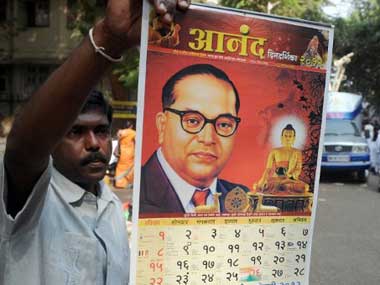Prime Minister Narendra Modi on Tuesday was among many Indian politicians who paid tribute to Dr BR Ambedkar on his 124th birth anniversary, and said, “Let us pledge to dedicate ourselves to creating India that Ambedkar dreamt of…an India that will make him proud”.
[caption id=“attachment_2195976” align=“alignleft” width=“380”]
 AFP image[/caption] However, even as we celebrated
Google
’s doodle in honour of Ambedkar, a report in
The Times of India
cited latest economic data from the National Sample Survey Office that showed that despite the availability of better amenities, the living and economic condition of members of the lower castes haven’t improved by much over the last decade. And proof of that is the fact that the disparity in incomes between the upper castes and lower ones hasn’t reduced. According to the report, NSSO data compared the average monthly expenditure of Dalit households with that of the upper caste households in 1999-2000 and said that there was a gap of 38 percent which changed only marginally to 37 percent in 2011-2012. In urban areas, upper caste households reported incomes that were 65% more than dalit households in 1999-2000. This gap reduced to a still shocking 60% in 2011-12, the
report
further added. The article noted that despite poor economic conditions, a large chunk of the lower community is still seizing opportunities to study. The proportion of graduates in Dalit population was 4.6 percent in 1999 which in 2011 stood at 9.4 percent in urban areas. Speaking to TOI, professor of sociology at the Jawaharlal Nehru University and a researcher of Dalit community, Surinder S Jodhka, said that despite education the economic chasm still existed because schemes meant for Dalit and lower communities seldom reach the ones who needed it the most. While political parties and politicians are busy trying to appropriate Ambedkar’s legacy, the larger concerns of the community seem to have been ignored.
AFP image[/caption] However, even as we celebrated
Google
’s doodle in honour of Ambedkar, a report in
The Times of India
cited latest economic data from the National Sample Survey Office that showed that despite the availability of better amenities, the living and economic condition of members of the lower castes haven’t improved by much over the last decade. And proof of that is the fact that the disparity in incomes between the upper castes and lower ones hasn’t reduced. According to the report, NSSO data compared the average monthly expenditure of Dalit households with that of the upper caste households in 1999-2000 and said that there was a gap of 38 percent which changed only marginally to 37 percent in 2011-2012. In urban areas, upper caste households reported incomes that were 65% more than dalit households in 1999-2000. This gap reduced to a still shocking 60% in 2011-12, the
report
further added. The article noted that despite poor economic conditions, a large chunk of the lower community is still seizing opportunities to study. The proportion of graduates in Dalit population was 4.6 percent in 1999 which in 2011 stood at 9.4 percent in urban areas. Speaking to TOI, professor of sociology at the Jawaharlal Nehru University and a researcher of Dalit community, Surinder S Jodhka, said that despite education the economic chasm still existed because schemes meant for Dalit and lower communities seldom reach the ones who needed it the most. While political parties and politicians are busy trying to appropriate Ambedkar’s legacy, the larger concerns of the community seem to have been ignored.
)